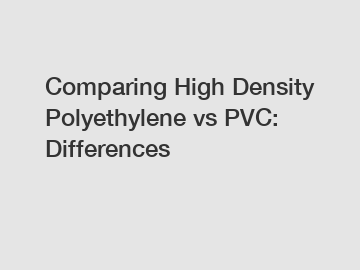Comparing High Density Polyethylene vs PVC: Differences
Apr. 07, 2024
### High Density Polyethylene vs PVC: Differences.
When comparing High Density Polyethylene (HDPE) and Polyvinyl Chloride (PVC), it is important to consider their differences in terms of properties, uses, and environmental impact.
#### Properties:

1. **High Density Polyethylene (HDPE)**:
- HDPE is a thermoplastic polymer known for its high strength and density.
- It is resistant to chemicals and moisture, making it suitable for various applications.
- HDPE is lightweight and flexible, with good impact and abrasion resistance.
2. **Polyvinyl Chloride (PVC)**:
- PVC is a synthetic polymer that is known for its versatility and durability.
- It is resistant to chemicals, weathering, and abrasion.
- PVC can be rigid or flexible, depending on the additives used during manufacturing.
#### Uses:
1. **High Density Polyethylene (HDPE)**:
- HDPE is commonly used in the production of plastic bottles, pipes, and packaging materials.
- It is also used in the construction industry for geomembranes and drainage systems.
- HDPE is widely used in the healthcare sector for medical devices and equipment.
2. **Polyvinyl Chloride (PVC)**:
- PVC is used in a wide range of applications such as window frames, pipes, and flooring.
- It is commonly used in the construction industry for plumbing, roofing, and insulation.
- PVC is also used in the healthcare sector for IV tubing, blood bags, and medical devices.
#### Environmental Impact:
1. **High Density Polyethylene (HDPE)**:
- HDPE is considered to be more environmentally friendly than PVC.
- It can be recycled easily and is used in a variety of sustainable products.
- HDPE has a lower carbon footprint compared to PVC.
2. **Polyvinyl Chloride (PVC)**:
- PVC has a higher environmental impact due to the presence of chlorine in its composition.
- It is less easily recycled and can release toxic gases when incinerated.
- PVC has been a subject of concern for environmental organizations due to its potential harmful effects.
In conclusion, while both High Density Polyethylene (HDPE) and Polyvinyl Chloride (PVC) have their own set of properties and uses, HDPE is generally considered to be more environmentally friendly compared to PVC. It is important to consider these differences when choosing between the two materials for a particular application.
Contact us to discuss your requirements of price of hdpe pipe, self-floating dredge hose, uhmwpe pipe for sale. Our experienced sales team can help you identify the options that best suit your needs.
114
0
0


Comments
All Comments (0)